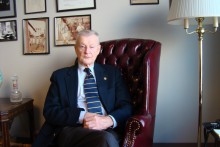He was one of the world’s most prominent theorists in the field of political science and geopolitics, as well as one of the most effective practitioners of that art, whose efforts contributed to the destruction of the “evil empire” of the Soviet Union.
I was greatly fortunate to know Zbigniew Brzezinski, meet and work with him on many occasions, visit his home during holidays, discuss the fate of Ukraine and ways of strengthening strategic relations between Ukraine and the US.
Brzezinski, known to his friends and colleagues as Zbig, combined that special Polish romantic spirit of freedom and independence with the American hard pragmatic approach to global phenomena. Ukraine occupied a special place in his heart, as an important part of the former Polish-Lithuanian Commonwealth and as a future ally of Poland and the US, an important factor of European security as forces of democracy confront imperial Russia’s totalitarian threat.
He told me how his father, a Polish diplomat and spy stationed in the Ukrainian city of Kharkiv in the 1930s, instilled in young Zbig’s mind the love, respect, and compassion for the Ukrainian people and its suffering during the Holodomor and the Red Terror.
It was not for nothing that Brzezinski’s master’s thesis dealt with the Russian nationalism and Soviet imperialism. Zbig proposed that Russia, then called the Soviet Union, was an actual empire which was to be destroyed by rising nationalism of Soviet republics, especially Ukraine.
It was the origin of Brzezinski’s immortal formula: independent Ukraine makes impossible the existence of the Soviet (Russian) empire.
From the very beginning of Ukrainian independence, Brzezinski provided the young nation with assistance the value of which cannot be overestimated.
I first met him in New York in 1995, during a meeting of the Joint Ukrainian-American Committee that included Brzezinski, Henry Kissinger, and a number of prominent American statesmen.
We met mostly in Washington, D.C., at the Center for Strategic and International Studies (CSIS); we communicated in Polish, which gave our relationship a special, almost familial flavor.
Brzezinski was known for his penchant for that special old Polish elegance, as he wore navy-blue blazers, striped silk ties, and shiny shoes. The hood of his car featured a metal sign: it was the Polish emblem, the white eagle.
His piercing assessments, brilliant formulas, and paradoxical replies were akin to sword jabs.
I am especially moved when I recall his sympathetic assessment of my book The Strategic Role of Ukraine, which was published by Harvard University.
I will never forget the words Zbig uttered after his visit to Kharkiv and Dnipropetrovsk [currently Dnipro]: “Yuri, you people do not understand yet how powerful Ukraine really is. It has a great future.”
Brzezinski was the object of special hatred from Moscow-based neo-imperialists. However, he actually stressed that he had great sympathy for the enslaved and brainwashed Russian people. Already in 2008 (cf. Zbigniew Brzezinski & Brent Scowcroft, America and the World), Zbig accurately determined Vladimir Putin’s nature and predicted his attempts to subordinate Ukraine and Georgia. Brzezinski was also prophetic when talking about the role of Putin, who has infected the Russian nationalism with Fascism, anti-Westernism, xenophobia, and racism.
Brzezinski belongs not only to Poland and the US. He was also a great son and ally of Ukraine. He belongs to the whole world, and not only to his time, but also to the future age.
Honored be his memory!








